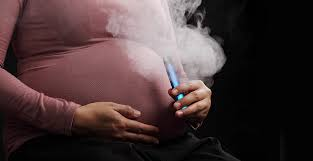
While there's no doubt that smoking during pregnancy poses numerous problems, what about vaping? Here are some insights.
Using an e-cigarette during pregnancy instead of smoking could help minimize risks for both the mother and the fetus. The primary dangers of smoking during pregnancy come from the thousands of harmful substances in cigarette smoke, most of which result from tobacco combustion. By heating a tobacco-free e-liquid, vaping eliminates most of these toxic compounds.
Why You Shouldn’t Smoke During Pregnancy
Smoking poses dangers not only to the smoker but also to those around them, including the fetus during pregnancy. Several studies1, 2, 3, 4 indicate that smoking while pregnant increases the risks of:
·Miscarriage
·Premature birth
·Ectopic pregnancy
·Low birth weight, which poses health risks for the baby
·Premature placental abruption
·Sudden infant death syndrome (SIDS)
·Respiratory problems at birth
·Growth retardation
Risks of Smoking During Pregnancy
Complications from smoking during pregnancy arise from certain compounds in cigarette smoke, such as lead, mercury, polycyclic aromatic hydrocarbons (PAHs), cadmium, cyanide, and carbon monoxide.
Respiratory Issues
Carbon monoxide in cigarette smoke leads to chronic oxygen deficiency for the fetus, doubling its concentration in the baby’s blood compared to the mother’s. This increases the child’s risk of respiratory problems and other pathologies.
Additionally, carbon monoxide is produced during the incomplete combustion of carbon-based materials, such as fossil fuels and forest fires. In homes, it can form from wood, butane, fuel, natural gas, petroleum, or propane heating systems, which is why regular ventilation in winter is essential.
Vaping, which heats e-liquid without burning it, eliminates combustion residues found in tobacco. Therefore, using an e-cigarette during pregnancy should reduce harm for both mother and child.
Risks of Obesity, Hypertonicity, and Learning Delays
Fetal exposure to smoking can have neurotoxic effects, making newborns more excitable and hypertonic. They require more handling and show more signs of stress or withdrawal, particularly in the central nervous system, gastrointestinal, and visual regions5. A 2002 German study6 found a link between maternal smoking during pregnancy and increased obesity risk in children. A 1973 study7 concluded that children of mothers who smoked during pregnancy were shorter and had a five-month delay in reading, math, and general abilities compared to non-smokers’ children.
Early Menopause and Reduced Fertility
Smoking reduces women’s chances of conceiving8, 9, 10 by decreasing ovocyte numbers, necessary hormones for embryo implantation, and pregnancy rates. Menopause also occurs two years earlier in smokers.
Nicotine’s Minimal Effects on Fetal Health
Most dangers of smoking during pregnancy come from harmful smoke compounds. However, nicotine, while best avoided, has been studied11, 12, 13, 14 in pregnant women using nicotine replacement therapy (patches, gum, nasal spray). Research generally concludes that nicotine alone has minimal impact on newborn health, with no significant differences between babies born to mothers using nicotine therapy and those who did not consume nicotine at all.
Several studies state: “The benefits of nicotine replacement therapy to help pregnant women quit smoking outweigh the risks of continued smoking or nicotine replacement itself.”
Passive Smoking: Another Pregnancy Risk
Passive smoking during pregnancy is also dangerous. A 2004 study15 showed that pregnant women exposed to cigarette smoke had higher risks of premature births and babies weighing 138 grams less on average than those not exposed.
Advantages of E-Cigarettes for Pregnant Smokers

Replacing smoking with vaping during pregnancy can reduce some risks.
While vaping should be avoided, current data are reassuring regarding its potential harm to mother and child. Due to the absence or reduced amounts of harmful compounds in e-cigarette vapor compared to tobacco smoke, vaping could limit risks for the fetus.
Normal Birth Weight for Babies
Research conducted over recent years16, 17, 18 indicates that babies born to vaping mothers have similar average birth weights to non-smokers and non-vapers. These findings were confirmed by a 2021 meta-analysis16.
Studies on delivery mode, perineal trauma, and postpartum hemorrhage rates found no significant differences between e-cigarette users and non-smokers
T67M.gif) n-vapers. No cases of neonatal respiratory distress were noted.
n-vapers. No cases of neonatal respiratory distress were noted.A 2020 study19 on mice concluded that “low-dose e-cigarette use during pregnancy is less toxic than cigarette smoke.” Another 2021 study20 indicated that “vaping products can reduce the health risks associated with smoking,” specifically for pregnant women.
Despite encouraging early data, the effects of vaping during pregnancy are still under-researched and not well understood. Replacing smoking with vaping should only be considered by pregnant women who cannot quit smoking using other methods. For the child’s health, the best solution remains not to smoke or vape.
